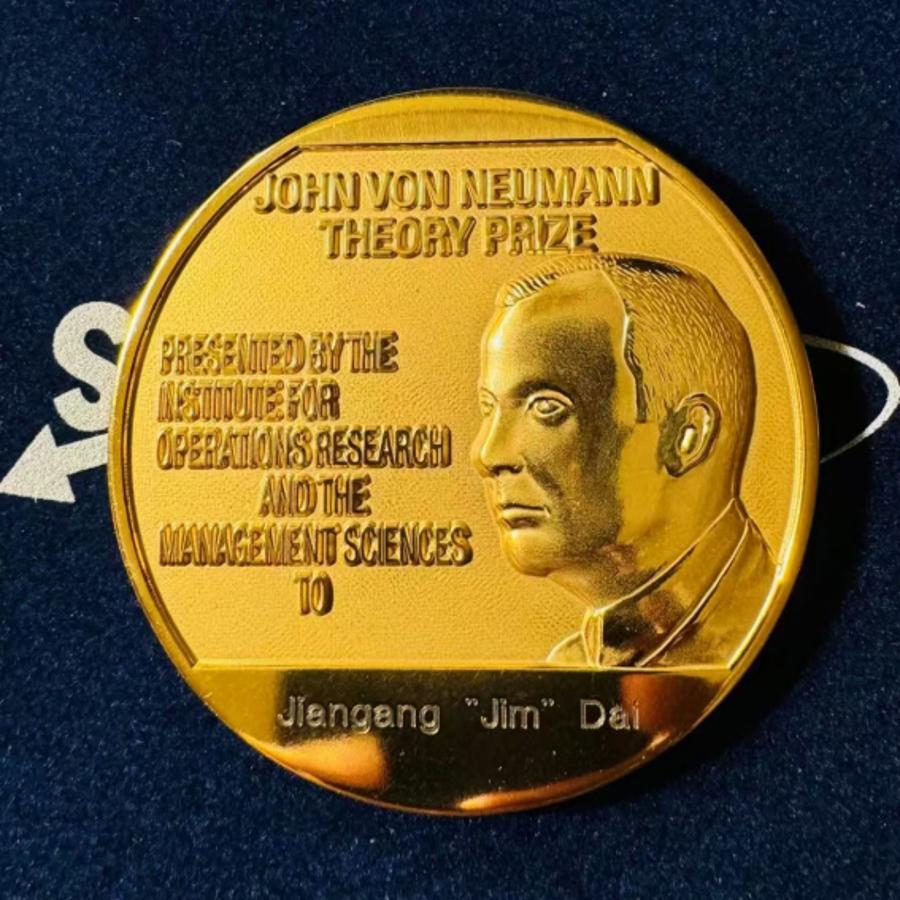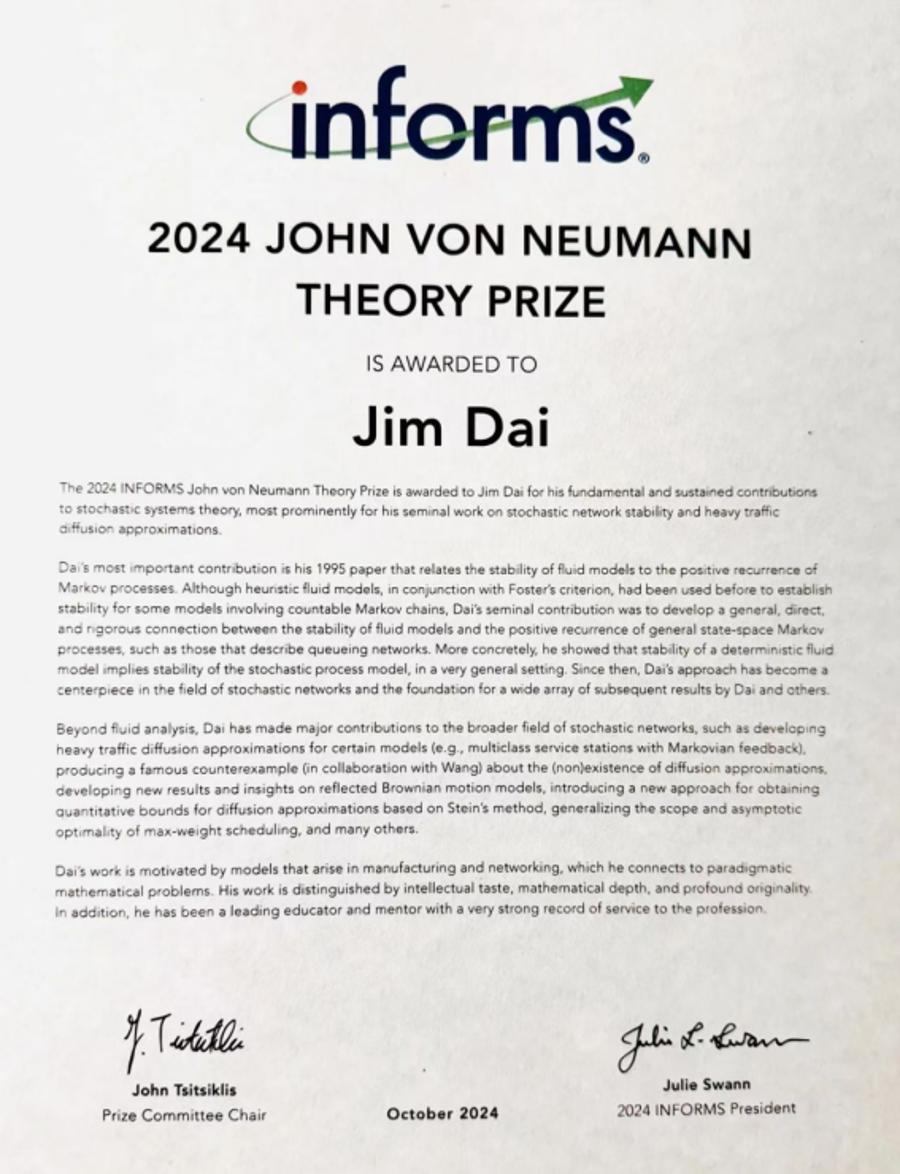
00:00 - 00:00
2024-10-30
Source: https://www.cuhk.edu.cn/en/article/14640
Professor Jim Dai, Dean of the School of Data Science at The Chinese University of Hong Kong, Shenzhen (CUHK-Shenzhen), has been awarded the 2024 John von Neumann Theory Prize at the INFORMS Annual Meeting in Seattle, USA. The prize recognizes his fundamental and sustained contributions to stochastic systems theory, particularly his seminal work on stochastic network stability and heavy traffic diffusion approximations.
The John von Neumann Theory Prize, the highest honour in operations research and management science, celebrates scholars who have made foundational and sustained contributions to the field.

Professor Jim Dai (centre) with INFORMS President Julie Swann (left) and INFORMS Executive Director Elena Gerstmann (right) at the award ceremony
At the award ceremony, Professor Julie Swann, the 2024 INFORMS President, and Professor John Tsitsiklis, Prize Committee Chair, highlighted Professor Dai’s distinctive approach: “His work is motivated by models that arise in manufacturing and networking, which he connects to paradigmatic mathematical problems. His work is distinguished by intellectual taste, mathematical depth, and profound originality. Additionally, he has been a leading educator and mentor with a very strong record of service to the profession”.


Professor Dai’s award particularly recognizes his seminal 1995 paper, “On positive Harris recurrence of multiclass queueing networks: A unified approach via fluid limit models”. This groundbreaking work established a pioneering connection between fluid model stability and the positive recurrence of general state-space Markov processes, such as those describing queueing networks. In this pivotal contribution, he demonstrated that under very general conditions, the stability of a deterministic fluid model implies the stability of the stochastic process model. This approach has since become a cornerstone in the field of stochastic networks and has laid the foundation for numerous subsequent developments by both Dai and others.
Beyond fluid analysis, Professor Dai has made substantial contributions to the broader field of stochastic networks. His achievements include developing heavy traffic diffusion approximations for multiclass service stations with Markovian feedback, producing a notable counterexample about the (non)existence of diffusion approximations (in collaboration with Wang), and introducing new methodologies for obtaining quantitative bounds for diffusion approximations based on Stein's method. He has also advanced the scope and asymptotic optimality of max-weight scheduling, among other significant contributions to the field.

Professor Jim Dai
Professor Jim Dai currently holds dual appointments as the Leon C. Welch Professor of Engineering at Cornell University’s School of Operations Research and Information Engineering, and Dean of the School of Data Science at The Chinese University of Hong Kong, Shenzhen. Prior to joining Cornell in 2012, he served at Georgia Institute of Technology from 1990, where he was appointed Edenfield Professor in 2007. His distinguished career includes positions as Special Term Professor at Tsinghua University’s School of Economics and Management (2002-2018) and James Riley Distinguished Visiting Professor at the National University of Singapore (2009-2011).
After completing his bachelor’s and master’s degrees in mathematics at Nanjing University, Professor Dai earned his PhD in Mathematics from Stanford University in 1990. His exceptional contributions to the field have been recognised through numerous prestigious awards, including the National Science Foundation’s Young Investigator Award (formerly Presidential Young Scientist Award) in 1994, the INFORMS Applied Probability Society’s Erlang Prize in 1998, and Best Paper Awards from the same society in both 1997 and 2017. Notably, he is the first Chinese scholar to receive the ACM SIGMETRICS Achievement Award (2018). Professor Dai served as Editor-in-Chief of Mathematics of Operations Research, a leading journal in the field, from 2012 to 2019. He is a Fellow of both the Institute of Mathematical Statistics (IMS) and the Institute for Operations Research and the Management Sciences (INFORMS).
John von Neumann Theory Prize
The John von Neumann Theory Prize stands as the highest honour in operations research and management science, recognising scholars who have made fundamental and sustained contributions to the field. Established in 1975, the prize is awarded annually at the INFORMS Annual Meeting, celebrating work that demonstrates enduring academic impact through its significance, innovation, depth, and scientific excellence over many years.
The prize’s prestigious history is marked by extraordinary recipients, beginning with George B. Dantzig, the inventor of the simplex algorithm for linear programming, who received the inaugural award in 1975. The following year, the prize was awarded to Richard E. Bellman, known as the father of dynamic programming—his algorithmic principles later became foundational to technologies like AlphaGo. The prize’s exceptional standing in the academic community is further evidenced by the fact that six of its fifty recipients have also been awarded the Nobel Prize in Economic Sciences.

